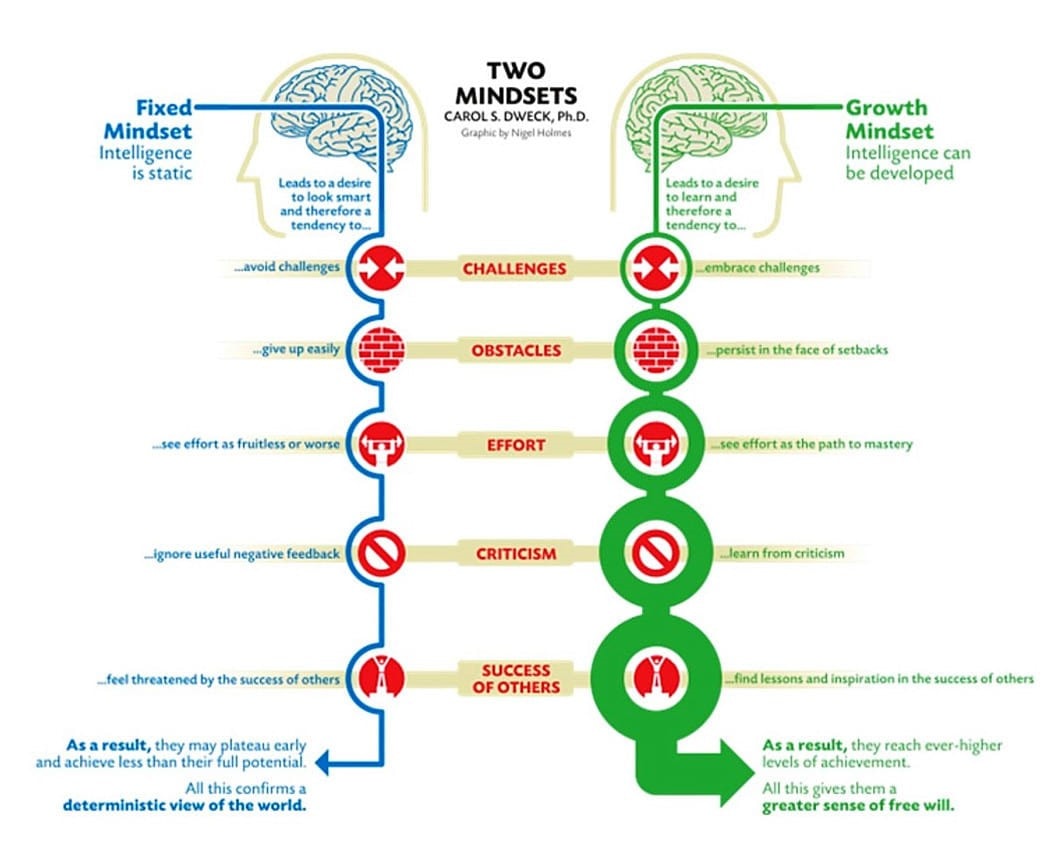So, Do You Have a Fixed or Growth Mindset?
I recently finished reading a book called No Limits: The Will to Succeed, which is a biography about Michael Phelps – the most decorated swimmer in Olympic history. Many people who have followed Phelps’ career may assume that his success stems mainly from genetics and God-given talent. There is no doubt he was blessed with an ideal frame for swimming. Large hands and feet, a long torso in relation to his legs, an insane wingspan and amazing flexibility in his shoulders, elbows, knees, and ankles – his body was clearly “made for swimming”. While genetics and God-given talent undoubtedly played a role in his success, it is not as big a factor as you may think. As I studied Phelps, I realized that the main contributor to his greatness had to more to do with his having a growth mindset than anything else. More on Phelps in a bit, but let’s first discuss a concept called “growth mindset” vs. “fixed mindset”.

To do this, let’s briefly explore the work of Carol Dweck of Stanford University. In her research, Dweck has found that people have one of two mindsets about their talents and abilities, the first mindset is a…
A Fixed Mindset
According to Dweck, “Those with a fixed mindset believe that their talents and abilities are simply fixed. They have a certain amount and that’s that.” 1
The second mindset Dweck describes is a…
Growth Mindset
Having a growth mindset on the other hand, “…think of talents and abilities as things they can develop—as potentials that come to fruition through effort, practice, and instruction.” 1
Those who have a growth mindset believe talent is something that you build upon and improve instead of something you show off and coast off.
Let’s now take a look at how the two mindsets differ by exploring the rules used by each to create the psychological worlds they operate in.
Distinguishing Between a Fixed Mindset vs. Growth Mindset: 3 Rules
RULE 1:
Fixed mindset: look talented no matter what!
Growth mindset: learn, learn, learn!
When Dweck has given students a choice between a challenging task they can learn from and one that makes them look smart, most who have a fixed mindset pick the latter. They believe their intelligence is fixed, they can’t get better and they want to always look good.
Those with a growth mindset, however, choose the former, as while they want to get good grades, they are more concerned with learning.
RULE 2:
Fixed mindset: don’t practice too much.
Growth mindset: put in the effort
With the second rule, those with a fixed mindset believe that if you possess natural talent, you don’t need to work hard. They believe that putting in effort can raise doubt as to their ability.
On the other hand, those with a growth mindset like working hard and believe it is necessary to grow their ability.
RULE 3:
Fixed mindset: hide or run away from your deficiencies when faced with setbacks.
Growth mindset: embrace the challenges that stem from your mistakes
The research done by Dweck and her team has shown that those with a fixed mindset have a hard time recovering from setbacks.
While on the other hand, those with a growth mindset stick with it and oftentimes end up prevailing in areas that at some point they were not good at.
Before we go any further, let’s take a quick look at the two mindsets side by side to explore their differences a bit more with this image from Dweck’s great book Mindset: The New Psychology of Success.
The Two Mindsets – Fixed Mindset vs. Growth Mindset (click to enlarge image)
Image credit: Mindset by Carol Dweck 2
The question you are probably asking is the same one I asked as I read Dweck’s book and research papers – “ok great, but how can one cultivate a growth mindset?”
This is where it gets interesting in a hurry.
The main thing to remember when trying to cultivate a growth mindset in others is to…
Praise the Process!
DO NOT praise someone for being intelligent, instead, praise the process they engaged in or how they did something!
According to Dweck: “In many studies, we have gotten a very surprising result. Praising children’s or adolescents’ intelligence or talent puts them into a fixed mindset with all of its defensiveness and vulnerability. Instead of instilling confidence, it tells them that we can read their intelligence or talent from their performance and that this what we value them for. After praising their intelligence or talent, we found that students wanted a safe, easy task, not a challenging one they could learn from.” 1
Instead, by praising their effort or the process they engage in, it pushed them into a growth mindset where they seek out challenges and sustain their efforts even when facing difficulty.
By focusing on improvement and learning instead of natural talent you are helping someone understand how they achieved their success but also what they can do to rebound from setbacks.
Managers, Coaches, and Parents…Listen Up!
Leading, coaching, and parenting with a growth mindset will show your employees, your players, and your children that you value passion, learning, and improvement. It will help them to welcome learning, seek out challenges, persist when confronted with setbacks, and most importantly to understand that effort is the path to mastery!
Back to Michael Phelps
There is no doubt that he possessed an inordinate amount of natural ability and many advantageous physical traits. However, without his having a growth mindset he would have had nowhere near the success he did.

Let me connect the dots with a few examples from his biography that demonstrate his having a growth mindset beautifully:
Exhibit A!
When he was young, his coach would ask him to do something and he would say, “I can’t do that.” His coach would respond, “…there’s a difference between “can’t” and “won’t”. Maybe you won’t do that, he would say. But you can. If you say “can’t”, you’re restricting what you can do or ever will do. You can use your imagination to do whatever you want. “Can’t” he would say, that’s a tough word.” 3
Clearly, his coach, Bob Bowman, knew how to cultivate Phelps having a growth mindset.
Exhibit B!
A bit later in the book, Phelps gave more insight as to how Bowman helped him develop a growth mindset. Instead of only being motivated by winning, Bowman showed him that he could also be motivated by improving his strokes.
He learned to focus on the process, rather than the outcome.
Exhibit C
The last example that shows Phelps having a growth mindset is my favorite. “For five years, from 1998 to 2003, we did not believe in days off. I had one because of a snowstorm, two more due to the removal of wisdom teeth. Christmas? See you at the pool. Thanksgiving? Pool. Birthdays? Pool…” 3
Incredible!
Quick math says that between 1998 and 2003, Phelps was in the pool 1,822 out of a possible 1,825 days.
If that isn’t having a growth mindset…I don’t know what is!
“If you put a limit on anything, you put a limit on how far you can go. I don’t think anything is too high” 3
–Michael Phelps
Until next time, keep having a growth mindset, praise the process and as always…PYMFP!
–Rick
Use It or Lose It – Having a Growth Mindset
When cultivating a growth mindset, praise the process!
Praise the effort and strategies the person has invested in and NOT their intelligence.
DO NOT praise someone for being intelligent, instead, praise the process they engaged in or how they did something!
When to Use It:
When coaching or mentoring someone into having a growth mindset.
What Do You Think?
Do you praise the process or someone’s intelligence? Will this blog post change how you praise people and how you cultivate a growth mindset in others?
If you enjoyed this post, it would mean the world to us if you shared it with people you care about via any of the social media platforms below!
Popular Previous Posts:
Mentally Strong People Don’t Do These 13 Things!
The Bystander Effect: So…What Would You Do?
Lessons from Tuesdays with Morrie That Will Make You Think
SCARF Model: This is How to Tighten Up Your Collaborations!
References
1 MINDSETS: DEVELOPING TALENT THROUGH A GROWTH MINDSET By Carol S. Dweck, Stanford University
2 Dweck, C. S. (2006). Mindset: The new psychology of success. New York: Random House.
https://www.ted.com/talks/carol_dweck_the_power_of_believing_that_you_can_improve
3 No Limits: The Will to Succeed
Dweck, C. S. (1999). Self-theories: Their role in motivation, personality and development. Philadelphia: Taylor and Francis/Psychology Press.
The Perils and Promises of Praise By Carol Dweck, Educational Leadership, October 2007, Volume 65, Number 2


This reminded me of an old joke. A man carrying a violin in its case is lost in New York City. He asks a fellow pedestrian “How do I get to Carnegie Hall?” The other man answers “Practice, practice, practice.”
In addition to having the necessary physical traits, the individual must also have an internal desire to succeed. Only the best of those possessing both aspects will advance up the ladder. Few high school players receive scholarships to play college ball. Few college players get drafted. Few of those who are drafted survive the cuts and play pro ball. Few professionals are inducted into the hall of fame. The cream rises to the top.
And a person must also understand his/her limitations. I played one year of college baseball, at a small school in a rural area. Could I have made the team at the University of Texas, a baseball powerhouse? I seriously doubt it. Heck, let’s be realistic. I would not have.
Forcing kids to participate in activities they have no interest in just results in defeat. That’s the main problem with mandatory physical education classes. They are universally hated. People understand their limitations, and have no reason to indulge in an activity that will result in failure.
Thank goodness instrumental music is not forced on the kids.
A minor criticism – I cannot read the small print in the illustration you included.
Hi Dave, that is a great joke, and one that Howie uses in class, great minds think alike. Great points and great examples, forcing kids into things is definitely a recipe for disaster. Thanks for the heads up on the image, I fixed it and made it clickable so people can see it up close, appreciate it. Be good, Rick